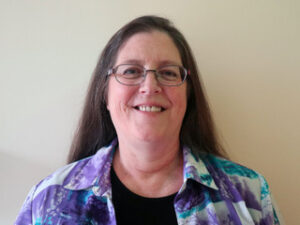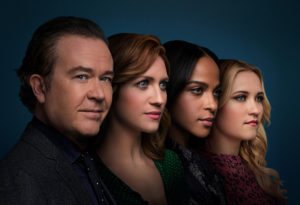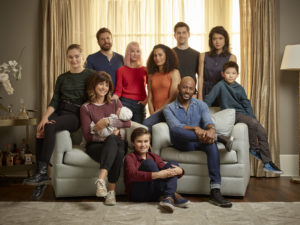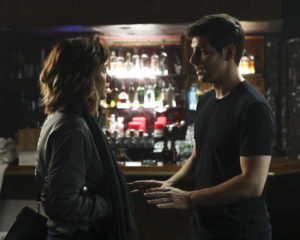Q&A With Podcast Host Don Anderson
Don Anderson is the creator and host of Missing Pieces – NPE Life, one of the newest in the ever-increasing number of podcasts for NPEs (not parent expected.) Here, he shares his own NPE journey and talks about the importance of support, community, and storytelling.
Please tell us a little about yourself—what was your life like before your DNA surprise?
I was born in 1965 in a state where I’ve never lived—Iowa. Our home was across the river in Illinois, but our doctor and hospital were in Iowa. I have lived in Los Angeles for over half my life, since I was 27. My wife and I are small business owners in the entertainment industry, and we are almost empty nesters. Our youngest will be starting his senior year of college in the fall.
Can you summarize as much as you’re comfortable sharing of your personal story of when and how your DNA surprise came about?
Rumors have swirled around my family in regard to my older sister for decades. She and I grew up thinking we were full siblings. Every ten years or so, someone would get drunk and angry and bring up that she wasn’t my father’s child. Then a few years ago, she found out it was true. My parents finally came clean. My mom was already pregnant when she met my dad. He was fully aware and agreed to raise her as his own. Two years later I was born.
That sister spent over a year and a half looking for her bio father but to no avail. I asked her if she needed help. I also did a 23andMe test so we we’d have something to compare. But when I received my results, I discovered I had two half-sisters I never even knew existed. And in fact there weren’t just two, there were four. It turns out my mother had a one-night stand with their father in 1965. My new siblings welcomed me into their family with open arms. My bio dad drank himself to death in 2010, which in a way has actually made the bond with my new siblings stronger. In telling me stories about him so I could know who he was, they realized there was a lot of good about their father that they hadn’t been focusing on. And I fit in with them way more than I ever did my in original family.
How are you absorbing or exploring this knowledge?
As my wife says, I am “all NPE all the time.” I dove in deep and read a lot about NPEs. In the beginning, I devoured all the NPE podcasts and in doing so found a way to place my feelings into perspective. Someone once told me there are two types of people in this world, those who want to find out what’s behind that closed door and those who don’t. I especially think this is true in our NPE world. I am definitely one who wants—actually who needs—to know what’s behind that door. So eventually I started my own podcast.
What aspect of your own experience was most difficult for you?
My dad grew up on a farm in NE Iowa. He’s 100% Scandinavian. When I was 16, I saw a family tree in which someone traced our Norwegian side of the family back to a couple who came over on the boat from Norway in 1855. I was hooked. I dove into my Norwegian heritage. (No one else in my family was into it like I was.) I’ve gone to Norway twice, and I found the farm that my ancestors sold to come to America. For Christmas dinners, I make Norwegian meatballs. I have a Norwegian flag on my office wall. On the day I found my new half-sisters, I also found out I’m not Norwegian at all. It’s heartbreaking for me.
What helped you most?
Listening to NPE podcasts, especially NPE Stories, helped me process my feelings a lot during those first few months after my discovery. Hearing others talk about the same feelings I was having was huge. And finding out I wasn’t alone took so much of the shame away. Severance Magazine and certain Facebook groups (not the big one) help in that regard too. I was in an NPE group therapy for three months or so. That helped me quite a bit. Nowadays, I also see an NPE therapist (she is an NPE) and I am seeing a lot of benefits from that.
How and why did you decide to do a podcast?
I’m in the film business, have produced and edited a feature length documentary, and have been working on my own documentary for six years. (It’s about kids who grew up in a cult.) It’s a labor of love for sure. So right after I discovered my dad wasn’t my dad, I knew I wanted to do something creative. Matter of fact, my steps in finding out about the NPE world were:
- I googled “my dad isn’t my dad” and somewhere amongst those results I found the term NPE
- I thought I wanted to do an NPE podcast, so I googled NPE podcast to see if there were any being produced already. That’s how I found Lily’s podcast, NPE Stories.
- And actually, as a side note, I emailed one of Lily’s guests, and she’s the one who told me about the Facebook groups.
There are a number of NPE/DNA surprise podcasts—how do you describe yours?
I’ve been a huge fan of This American Life for decades, long before the word podcast ever existed. I am heavily influenced by that show/podcast. But I try to make every episode like a documentary. I really like to use archival footage when it’s available and appropriate. I add music to enhance the listening experience. I often have more than one person telling a story. Whereas some podcast creators will have an NPE telling their story, I want their mom and their brother to tell their side of the story too. I think there’s room for all of our podcasts because they are different with different styles and content, which is good for the listener to have plenty of variety. I also make sure the audio is high quality. I often have my guests purchase microphones. I can’t handle bad audio.
What’s been the reaction? What are you hearing from listeners?
So far, people have reacted positively. I had contacted an NPE I found on Severance actually and asked him to be a guest. I sent him episode two of my podcast, which is about me and my four new half-sisters. He loved it and said, “Have you ever heard of This American Life? Your podcast reminds me of that.” I told him thanks and that you could not bestow a better compliment on me than that. I felt like a million bucks.
What if anything has most surprised you in the course of interviewing?
How often I bump my table and microphone has surprised me a quite a bit. Also, I think everyone I have interviewed, other than the “Unsolved Murder” episode, has cried, which I think is a wonderful thing. I wish there wasn’t a need for them to cry but I am grateful that they feel safe enough with me to let it out. It’s powerful.
Why do you think it’s important for people to share their stories? Why is it important for the storyteller and why is it important for others who receive the stories?
As I alluded to earlier, listening to others tell their story has helped me process my feelings better than anything else. It’s magic. And I think someone telling their story to someone who has been in their shoes is magic squared. There’s this old song I recall from my teenage years and the lyric was something like…“what would touch you deeper, that tears that fall from eyes that only cry, would it touch you deeper, tears that fall from eyes that know why?”
When we tell our stories it helps us heal. Full stop.
Based on the podcasts you’ve done so far, what would you say are the most universally difficult aspects of the experience?
Finding out your dad isn’t your dad hurts. It just does. And it changes lives, one way or another.
A heard someone in a self-help group say, “If it ain’t one thing, it’s your mother.” As NPEs, I think most of our relationships with our mothers is, at best, complicated. The reasons for that are both obvious and complex. And the severity is, of course, different amongst us, but all in all this seems to be the most difficult aspect. I could go on and on about why I think that but a couple things that stand out are that the majority of NPE people I’ve heard interviewed say their moms have narcissistic traits. I don’t know if that’s because those are the type of women who are more likely to have an NPE or if it’s that children of narcissist mothers are more apt to go on podcasts and tell their stories. Either way, it seems to be a thing.
On episode four of my podcast I interviewed four women who are pillars in our NPE community: Eve Sturges, a therapist and host of the podcast Everything’s Relative with Eve Sturges; Erin Cosentino, co-founder of Hiraeth Hope & Healing and founder of NPE Only Facebook group; Lily Wood, host of NPE Stories; and Gina Daniels, PhD, of Graystone Mental Health and Wellness Group. I asked them all four questions, one of which was, “what is your relationship like with your mother nowadays?” Their answers were all of course different but so amazing and complex and just full of pain and hope all rolled into one. They took the discussion to another level.
But also I have to say that as a society, we have such double standards when it comes to women cheating vs men cheating. I am not condoning anyone cheating but I think that creates a lot of shame in our mothers. And shame is a horrible thing, so I try to have compassion. I have forgiven my mother. Her “mistake” 56 years ago created a pretty amazing person. I’ve forgiven her for her past. However, her reluctance to discuss it today really puts a damper on our relationship.
Are you looking for participants and if so, how should they contact you??
I’m always on the hunt for good stories, especially those with a twist. I’m drawn to stories where I can weave multiple interviews from different people into one narrative. If someone has old footage/recordings of their bio dad that’s pertinent to their story, by all means, get in touch with me. Also, I often look for people who don’t even know what NPE means. My most popular episode by far is about a woman who was switched at birth in 1958. She’s known for over 20 years but did not know what an NPE was until I contacted her. Since then she’s been on the Facebook group Togetherness Heals getting support and giving support to others. That fact alone, that I was able to help her find us, the NPE community, has been one of the amazing outcomes of doing my podcast.
If someone thinks their story would be a good fit, the best way to contact me is on Instagram. I don’t really have an email set up yet…who needs another email. And if you aren’t on the gram…ask your kid to send me a message on your behalf.
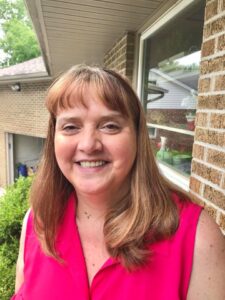 Tell me a little bit about your background, how you came to be interested in creating DNAngels, and how you educated yourself about genetic genealogy?
Tell me a little bit about your background, how you came to be interested in creating DNAngels, and how you educated yourself about genetic genealogy?